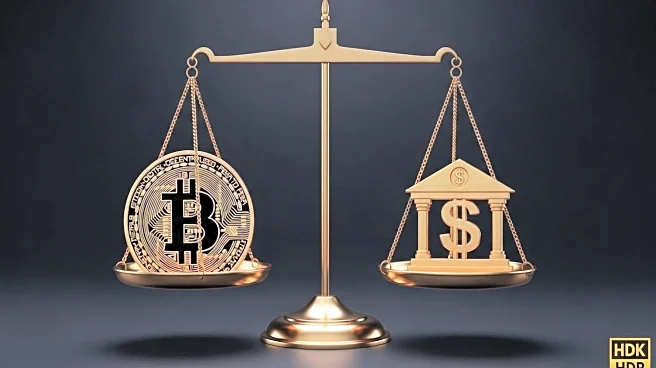What's Happening?
Bitcoin has been the subject of various misconceptions since its inception, including associations with criminal activity and environmental concerns. Despite its decentralized network and capped supply, Bitcoin's role as a traditional inflation hedge or safe-haven asset is under scrutiny. Recent data from 2025 shows Bitcoin has not outperformed gold during periods of high inflation and rising interest rates, leading to questions about its reliability as a diversification tool. Institutional investors are concerned about Bitcoin's inconsistent correlation with macroeconomic indicators, unlike gold, which historically correlates negatively with the U.S. dollar and positively with inflation. Regulatory developments are also contributing to uncertainty, with new regulations potentially impacting Bitcoin's liquidity and accessibility.
Why It's Important?
The scrutiny of Bitcoin's role in the market is significant as global investors seek reliable tools to protect their capital from inflation and geopolitical uncertainties. While gold remains a trusted asset class, Bitcoin's track record has not demonstrated the stability required to earn the same level of trust. The debate over Bitcoin's macroeconomic properties comes at a time when its adoption by corporations and institutional investors is rising. However, its role in portfolio diversification remains unproven and speculative. Analysts urge caution in using Bitcoin as a hedge against macroeconomic risks until it shows consistent performance during financial stress and inflation.
What's Next?
As the crypto market evolves, the regulatory environment will play a crucial role in shaping Bitcoin's future as an investment. Jurisdictions are considering regulations that could impact Bitcoin's liquidity, including increased reporting requirements and scrutiny of exchanges. Market participants argue that Bitcoin's utility as a store of value could emerge over time, particularly with increased corporate and institutional adoption. However, until Bitcoin demonstrates consistent performance, its status as a true alternative to gold remains in question.
Beyond the Headlines
The deeper implications of Bitcoin's scrutiny involve ethical and legal dimensions, particularly concerning regulatory developments. Increased regulations could affect Bitcoin's accessibility and liquidity, impacting its adoption and market behavior. The evolving crypto market also raises questions about long-term shifts in investment strategies and the role of digital assets in traditional portfolios.









